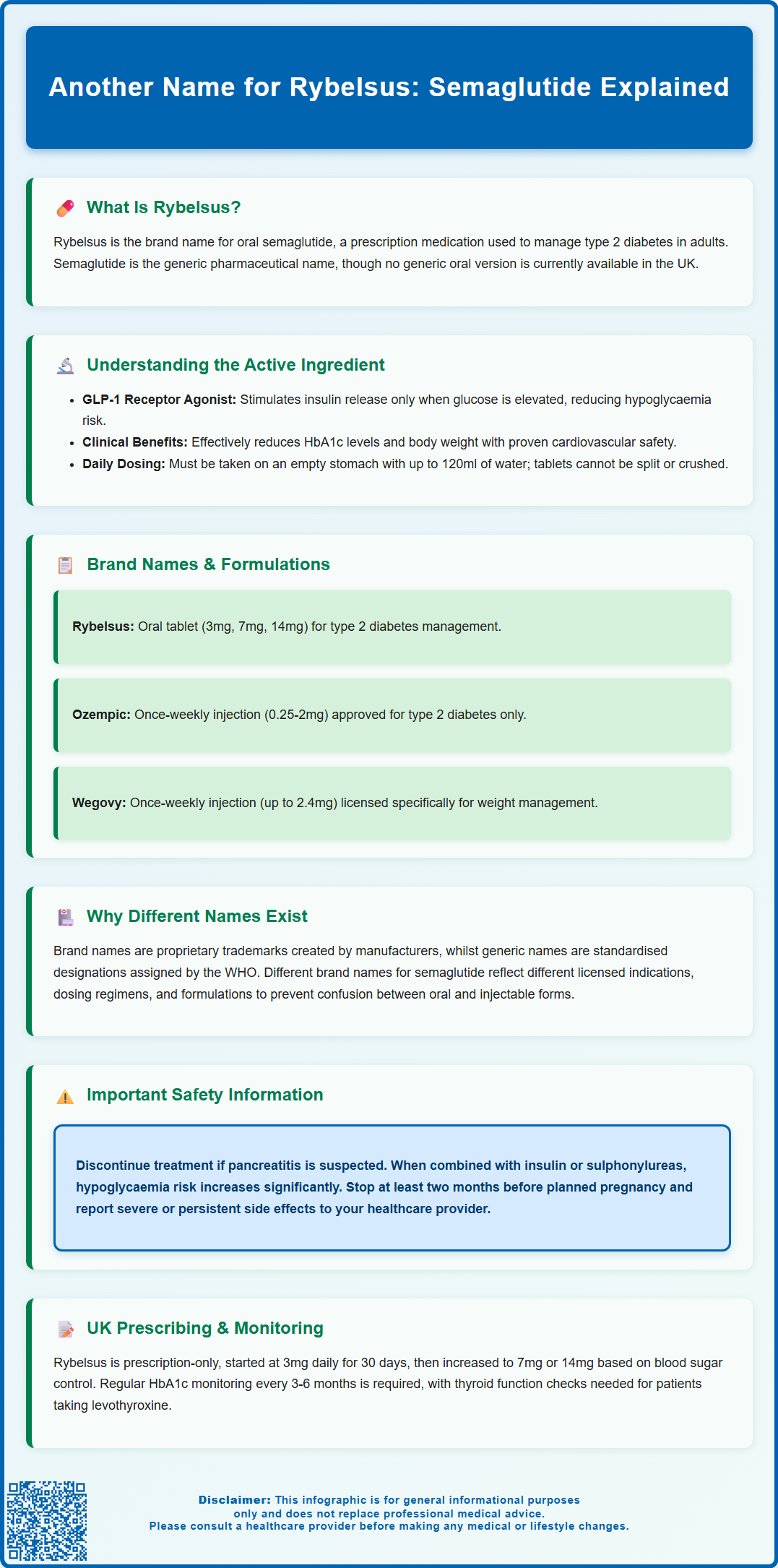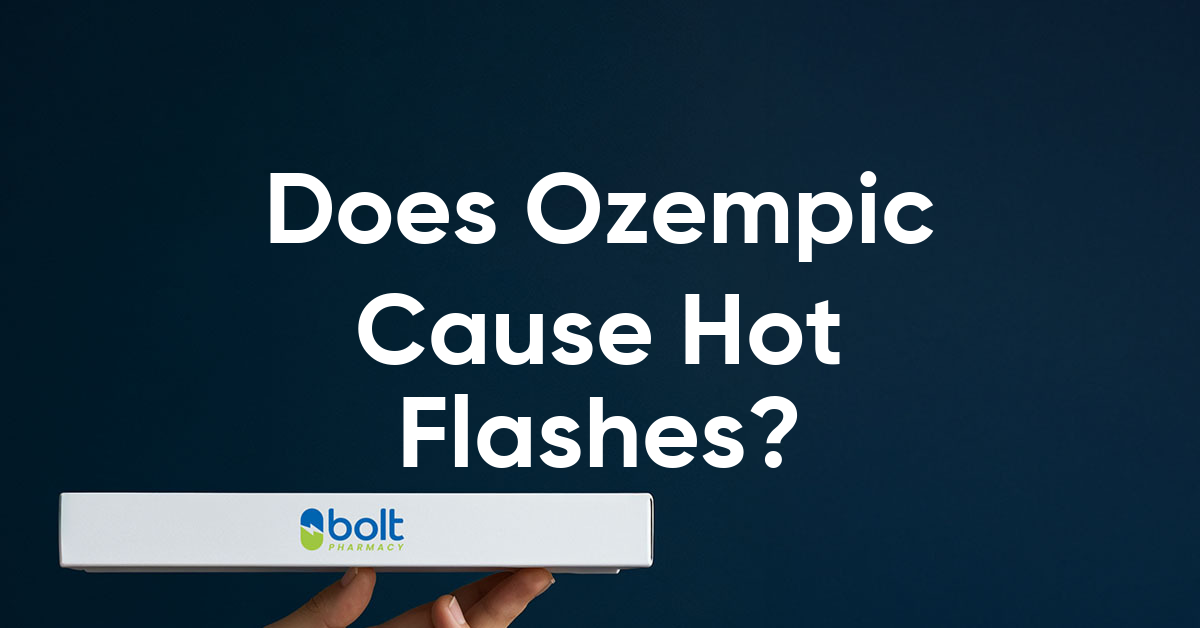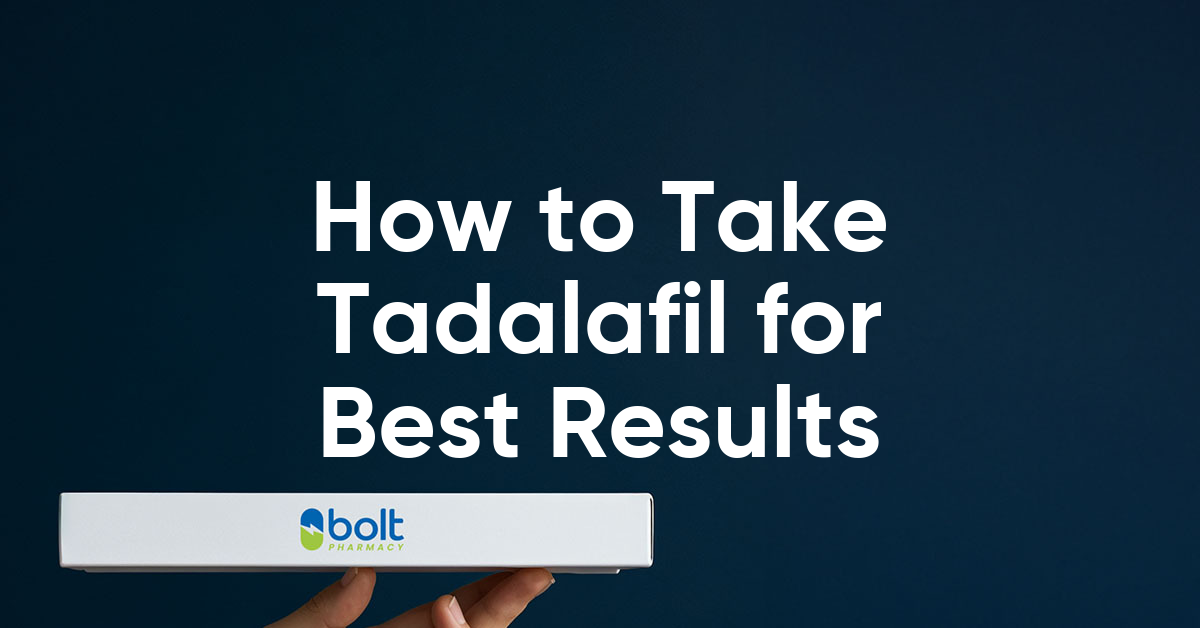Rybelsus is the brand name for oral semaglutide, a prescription medication used to manage type 2 diabetes mellitus in adults. The generic name—the official pharmaceutical designation—is semaglutide. Understanding the distinction between brand and generic names is essential for patients and healthcare professionals, as it helps avoid confusion when discussing treatment options or reading prescriptions. Semaglutide is also marketed under other brand names, including Ozempic (injectable for diabetes) and Wegovy (injectable for weight management), each with distinct formulations and licensed indications. This article explains why different names exist for the same active ingredient and what patients need to know.
Summary: Another name for Rybelsus is semaglutide, which is the generic (active ingredient) name for this oral medication used to treat type 2 diabetes.
- Rybelsus is the brand name for oral semaglutide, a glucagon-like peptide-1 (GLP-1) receptor agonist used in type 2 diabetes management.
- Semaglutide is also marketed as Ozempic (injectable for diabetes) and Wegovy (injectable for weight management), each with different licensed indications.
- Rybelsus must be taken on an empty stomach with up to 120 ml of water, at least 30 minutes before food or other medications, and tablets must not be split or crushed.
- Prescribing by brand name is recommended to avoid confusion between oral and injectable formulations of semaglutide.
- Common adverse effects include nausea, vomiting, and diarrhoea; patients should be monitored for pancreatitis, diabetic retinopathy complications, and hypoglycaemia when used with insulin or sulphonylureas.
- NICE guidance (TA761) recommends oral semaglutide as part of comprehensive type 2 diabetes management including diet, exercise, and regular HbA1c monitoring.
Table of Contents
What Is Rybelsus? Understanding the Generic Name
Rybelsus is the brand name for oral semaglutide, a prescription medication used primarily for the management of type 2 diabetes mellitus in adults. The generic name—the official pharmaceutical designation—is semaglutide. Understanding the distinction between brand and generic names is essential for patients and healthcare professionals alike, as it helps avoid confusion when discussing treatment options or reading prescriptions.
In the UK, medications are typically referred to by both their brand name (assigned by the manufacturer) and their generic name (the active pharmaceutical ingredient). Rybelsus is manufactured by Novo Nordisk and represents the first oral formulation of semaglutide approved for clinical use. It's important to note that while semaglutide is the generic name, there is currently no licensed generic oral semaglutide product available in the UK. Prior to Rybelsus, semaglutide was only available as a subcutaneous injection under different brand names.
When healthcare professionals prescribe this medication, it is recommended they use the brand name 'Rybelsus' rather than just 'semaglutide' to avoid potential confusion with injectable formulations of semaglutide. Patients may encounter both terms on prescription labels, patient information leaflets, and during consultations. While Rybelsus and oral semaglutide refer to the same medication, brand-specific prescribing helps ensure patients receive the correct formulation.
The naming of medicines follows international standards, with the World Health Organization (WHO) assigning International Nonproprietary Names (INNs), while the Medicines and Healthcare products Regulatory Agency (MHRA) oversees the licensing and reviews brand names in the UK. This regulatory framework helps maintain patient safety by reducing the risk of medication errors and ensuring that patients receive the correct treatment.

Semaglutide: The Active Ingredient in Rybelsus
Semaglutide is a glucagon-like peptide-1 (GLP-1) receptor agonist, a class of medications that mimics the action of the naturally occurring hormone GLP-1. This hormone plays a crucial role in glucose homeostasis by stimulating insulin secretion in a glucose-dependent manner, suppressing glucagon release, slowing gastric emptying, and promoting satiety. By activating GLP-1 receptors, semaglutide helps lower blood glucose levels in people with type 2 diabetes.
The pharmacological action of semaglutide is highly specific. It binds to GLP-1 receptors on pancreatic beta cells, enhancing insulin secretion only when blood glucose levels are elevated. This glucose-dependent mechanism reduces the risk of hypoglycaemia compared to some other diabetes medications. However, when used in combination with insulin or sulphonylureas, the risk of hypoglycaemia increases significantly, and dose reductions of these medications may be necessary.
Semaglutide has a long half-life of approximately one week, which allows for once-weekly dosing in its injectable formulations. However, the oral formulation (Rybelsus) requires daily administration due to the challenges of achieving adequate absorption through the gastrointestinal tract. The oral tablets contain semaglutide co-formulated with an absorption enhancer (sodium N-(8-[2-hydroxybenzoyl] amino) caprylate, or SNAC) to facilitate absorption across the gastric mucosa.
Rybelsus tablets must be swallowed whole with up to 120 ml of water on an empty stomach. Tablets should not be split, crushed, or chewed. If a dose is missed, patients should skip that dose and take the next scheduled dose the following day—they should not take a double dose.
Clinical trials have demonstrated that semaglutide effectively reduces HbA1c levels (a marker of long-term blood glucose control) and body weight. The PIONEER clinical trial programme specifically evaluated oral semaglutide, showing significant improvements in glycaemic control and cardiovascular safety (non-inferiority to placebo). These evidence-based benefits have led to semaglutide's inclusion in national and international diabetes management guidelines.
Important safety considerations include monitoring for pancreatitis (treatment should be discontinued if suspected), caution in patients with pre-existing diabetic retinopathy, and awareness of potential gallbladder disease. Rybelsus is not recommended during pregnancy and should be discontinued at least two months before a planned pregnancy.
Brand Names and Formulations of Semaglutide
Semaglutide is marketed under several brand names, each corresponding to a specific formulation and approved indication. Understanding these different brands helps clarify why patients may encounter various names for what is essentially the same active ingredient.
Rybelsus is the brand name exclusively for the oral tablet formulation of semaglutide, available in three strengths: 3 mg, 7 mg, and 14 mg. It is indicated for the treatment of type 2 diabetes mellitus in adults, typically as an adjunct to diet and exercise. The oral route offers convenience for patients who prefer not to use injectable medications. NICE Technology Appraisal (TA761) provides specific guidance on the use of oral semaglutide within the NHS.
Ozempic is the brand name for semaglutide administered via subcutaneous injection, specifically for type 2 diabetes management. It is available in pre-filled pens delivering 0.25 mg, 0.5 mg, 1 mg, or 2 mg doses, administered once weekly. Ozempic has the same active ingredient as Rybelsus but differs in formulation, dosing frequency, and bioavailability. Importantly, Ozempic is not licensed for weight management. Its use in the NHS is guided by NICE guideline NG28 for type 2 diabetes management.
Wegovy is another injectable formulation of semaglutide, but it is licensed specifically for weight management in adults with obesity (BMI ≥30 kg/m²) or overweight (BMI ≥27 kg/m²) with at least one weight-related comorbidity. Wegovy is administered once weekly at higher doses than Ozempic, with a maximum maintenance dose of 2.4 mg. NHS access to Wegovy is restricted according to NICE guidance, which specifies eligibility criteria and requires use within specialist weight management services.
All three brands contain the same active pharmaceutical ingredient—semaglutide—but are approved for different indications and use different delivery systems. In the UK, prescribing decisions are guided by the specific licensed indication, patient preference, clinical circumstances, and local formulary recommendations.
Why Different Names Exist for the Same Medication
The existence of multiple names for semaglutide reflects standard pharmaceutical industry practices and regulatory frameworks. Brand names are proprietary trademarks created by manufacturers to distinguish their products in the marketplace, while generic names (International Nonproprietary Names or INNs) are standardised, non-proprietary designations assigned by the World Health Organization (WHO). In the UK, the MHRA approves licences and reviews invented names to minimise medication errors.
Pharmaceutical companies invest significantly in research, development, and clinical trials to bring new medications to market. Brand names serve several purposes:
-
Marketing differentiation: Brand names help distinguish one company's product from competitors, even when the active ingredient is the same.
-
Indication-specific branding: Different brand names for the same molecule can reflect different licensed indications, dosing regimens, or formulations (as seen with Rybelsus, Ozempic, and Wegovy).
-
Patient and prescriber recognition: Memorable brand names can improve medication adherence and reduce prescribing errors when clearly associated with specific indications.
-
Regulatory requirements: Each formulation and indication requires separate regulatory approval, and distinct brand names help maintain clarity in prescribing and pharmacovigilance.
From a clinical perspective, understanding both brand and generic names is essential for safe prescribing and dispensing. For semaglutide specifically, healthcare professionals should prescribe by brand name to avoid confusion between the oral and injectable formulations. Pharmacists must recognise that a prescription for 'semaglutide' without specifying the brand could refer to different formulations, and clarification of the intended brand and indication is necessary to prevent medication errors. Similarly, patients benefit from knowing that their medication may be referred to by different names in various healthcare settings, patient information resources, or when discussing treatment with different healthcare professionals.
The MHRA maintains a comprehensive database of approved medications, including all brand and generic names, to support safe medication use across the NHS and private healthcare sectors.
Prescribing and Availability in the UK
In the UK, Rybelsus (oral semaglutide) is available only on prescription and is not available over the counter. Prescribing is typically initiated by GPs, diabetologists, or specialist diabetes nurses working within primary or secondary care settings. The decision to prescribe Rybelsus is guided by NICE guidelines, local formularies, and individual patient circumstances.
NICE guidance (Technology Appraisal TA761, published in September 2021) recommends oral semaglutide as an option for treating type 2 diabetes in adults, either as monotherapy (when metformin is contraindicated or not tolerated) or in combination with other glucose-lowering medications. The guidance emphasises that treatment should be part of a comprehensive approach including dietary modification, physical activity, and regular monitoring of glycaemic control.
Key prescribing considerations include:
-
Initiation and titration: Rybelsus is typically started at 3 mg once daily for 30 days, then increased to 7 mg daily. If additional glycaemic control is needed after at least 30 days on 7 mg, the dose may be increased to 14 mg daily.
-
Administration requirements: Rybelsus must be taken on an empty stomach with no more than 120 ml of water, at least 30 minutes before the first food, drink, or other oral medications of the day. Tablets must be swallowed whole and should not be split, crushed, or chewed. If a dose is missed, patients should skip that dose and take the next scheduled dose the following day—they should not take a double dose.
-
Monitoring: Patients should have regular HbA1c monitoring (typically every 3–6 months) to assess treatment efficacy. Healthcare professionals should also monitor for adverse effects, particularly gastrointestinal symptoms.
-
Safety considerations: Rybelsus is not indicated for type 1 diabetes or diabetic ketoacidosis. When used with insulin or sulphonylureas, consider reducing the dose of these medications to decrease the risk of hypoglycaemia. Patients with pre-existing diabetic retinopathy should be monitored closely. Treatment should be discontinued if pancreatitis is suspected. Rybelsus is not recommended during pregnancy or breastfeeding.
-
Interactions: Rybelsus may increase exposure to levothyroxine; thyroid function should be monitored in patients taking both medications. All other oral medicines should be taken at least 30 minutes after Rybelsus.
Common adverse effects include nausea, vomiting, diarrhoea, abdominal pain, and decreased appetite, which are generally mild to moderate and tend to diminish over time. Patients experiencing persistent or severe gastrointestinal symptoms should consult their healthcare provider. Other potential adverse effects include pancreatitis, diabetic retinopathy complications, and gallbladder disease. Patients should seek immediate medical attention if they experience severe abdominal pain or sudden vision changes.
Patients are encouraged to report any suspected side effects to the MHRA Yellow Card Scheme (yellowcard.mhra.gov.uk or via the Yellow Card app).
Frequently Asked Questions
Is semaglutide the same as Rybelsus?
Yes, semaglutide is the generic (active ingredient) name for Rybelsus. Rybelsus is the brand name for the oral tablet formulation of semaglutide used to treat type 2 diabetes in adults.
Why does semaglutide have different brand names?
Semaglutide is marketed under different brand names (Rybelsus, Ozempic, Wegovy) to reflect different formulations (oral or injectable) and licensed indications (type 2 diabetes or weight management). This helps healthcare professionals prescribe the correct formulation and reduces medication errors.
Can I get Rybelsus over the counter in the UK?
No, Rybelsus is available only on prescription in the UK. It must be prescribed by a GP, diabetologist, or specialist diabetes nurse, and prescribing is guided by NICE guidelines and individual patient circumstances.
The health-related content published on this site is based on credible scientific sources and is periodically reviewed to ensure accuracy and relevance. Although we aim to reflect the most current medical knowledge, the material is meant for general education and awareness only.
The information on this site is not a substitute for professional medical advice. For any health concerns, please speak with a qualified medical professional. By using this information, you acknowledge responsibility for any decisions made and understand we are not liable for any consequences that may result.
Heading 1
Heading 2
Heading 3
Heading 4
Heading 5
Heading 6
Lorem ipsum dolor sit amet, consectetur adipiscing elit, sed do eiusmod tempor incididunt ut labore et dolore magna aliqua. Ut enim ad minim veniam, quis nostrud exercitation ullamco laboris nisi ut aliquip ex ea commodo consequat. Duis aute irure dolor in reprehenderit in voluptate velit esse cillum dolore eu fugiat nulla pariatur.
Block quote
Ordered list
- Item 1
- Item 2
- Item 3
Unordered list
- Item A
- Item B
- Item C
Bold text
Emphasis
Superscript
Subscript












